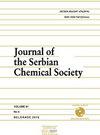High cell density cultivation of Bacillus subtilis NCIM 2063: Modeling, optimization and a scale-up procedure
IF 1
4区 化学
Q4 CHEMISTRY, MULTIDISCIPLINARY
引用次数: 0
Abstract
Bacillus subtilis is a non-pathogenic, sporulating, gram-positive bacteria with pronounced antimicrobial and metabolic activity and great potential for wide application in various fields. The aim of this paper was to determine the optimum B. subtilis NCIM 2063 growth conditions and to scale up biomass production from shake flasks to a bioreactor level. The critical growth parameters and their interaction effects were studied using Box-Bekhen experimental design and response surface methodology. Developed model equations were statistically significant with good prediction capability. It was found that during shake flask cultivation glucose should be added in concentration up to 5 g l-1 in DSM medium, OTR at 10 mol m-3h-1 and temperature of 33 ?C, to achieve the maximum number of viable cells and spores. To scale up the process from shake flasks to the bioreactor level kLa was used as a main criterion. Scale up effect was evaluated by comparing the growth kinetics in the shake flasks and in a laboratory bioreactor. The total number of cells obtained in the bioreactor was 4.57?109 CFU ml-1 which is 1.41 times higher than the number of cells in the shake flasks (3.24?109 CFU ml-1), proving that the scale-up procedure was conducted successfully.枯草芽孢杆菌NCIM 2063的高密度培养:建模、优化和放大过程
枯草芽孢杆菌是一种非致病性、产孢子的革兰氏阳性菌,具有显著的抗菌和代谢活性,在各个领域具有广泛的应用潜力。本文的目的是确定最佳枯草芽孢杆菌NCIM 2063的生长条件,并将生物质生产从摇瓶扩大到生物反应器水平。采用Box-Bekhen试验设计和响应面法研究了关键生长参数及其交互效应。所建立的模型方程具有统计学显著性,预测能力较好。在摇瓶培养过程中,在DSM培养基中添加浓度为5 g l-1的葡萄糖,在10 mol m-3h-1的OTR和33℃的温度下,可以达到最大的活细胞和孢子数量。为了将工艺从摇瓶放大到生物反应器水平,kLa被用作主要标准。通过比较摇瓶和实验室生物反应器中的生长动力学来评估放大效应。在生物反应器中获得的细胞总数为4.57?109 CFU ml-1,比摇瓶中的细胞数(3.24?109 CFU ml-1),证明放大过程成功进行。
本文章由计算机程序翻译,如有差异,请以英文原文为准。
求助全文
约1分钟内获得全文
求助全文
来源期刊
CiteScore
1.80
自引率
0.00%
发文量
76
审稿时长
1 months
期刊介绍:
The Journal of the Serbian Chemical Society -JSCS (formerly Glasnik Hemijskog društva Beograd) publishes articles original papers that have not been published previously, from the fields of fundamental and applied chemistry:
Theoretical Chemistry, Organic Chemistry, Biochemistry and Biotechnology, Food Chemistry, Technology and Engineering, Inorganic Chemistry, Polymers, Analytical Chemistry, Physical Chemistry, Spectroscopy, Electrochemistry, Thermodynamics, Chemical Engineering, Textile Engineering, Materials, Ceramics, Metallurgy, Geochemistry, Environmental Chemistry, History of and Education in Chemistry.

 求助内容:
求助内容: 应助结果提醒方式:
应助结果提醒方式:


